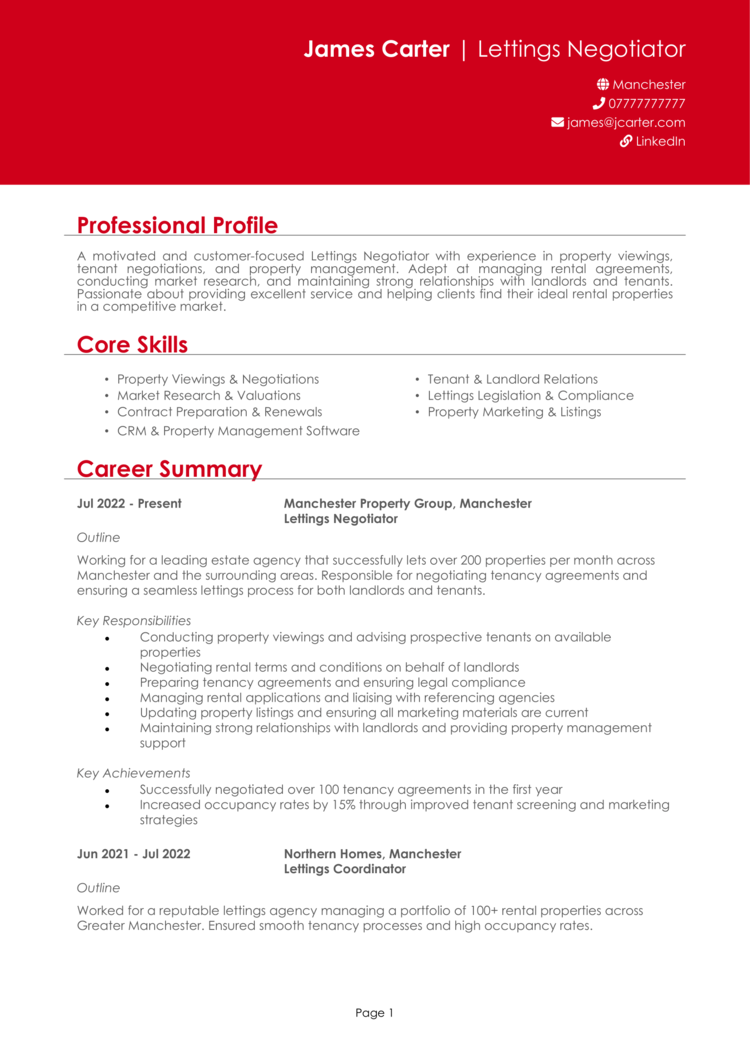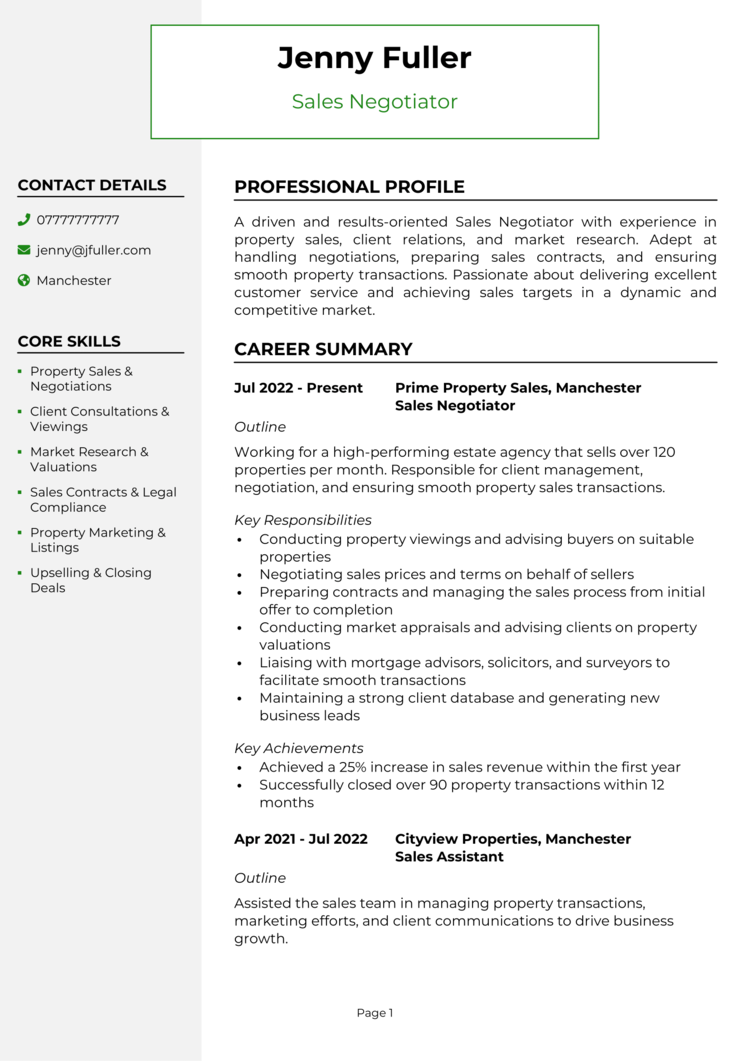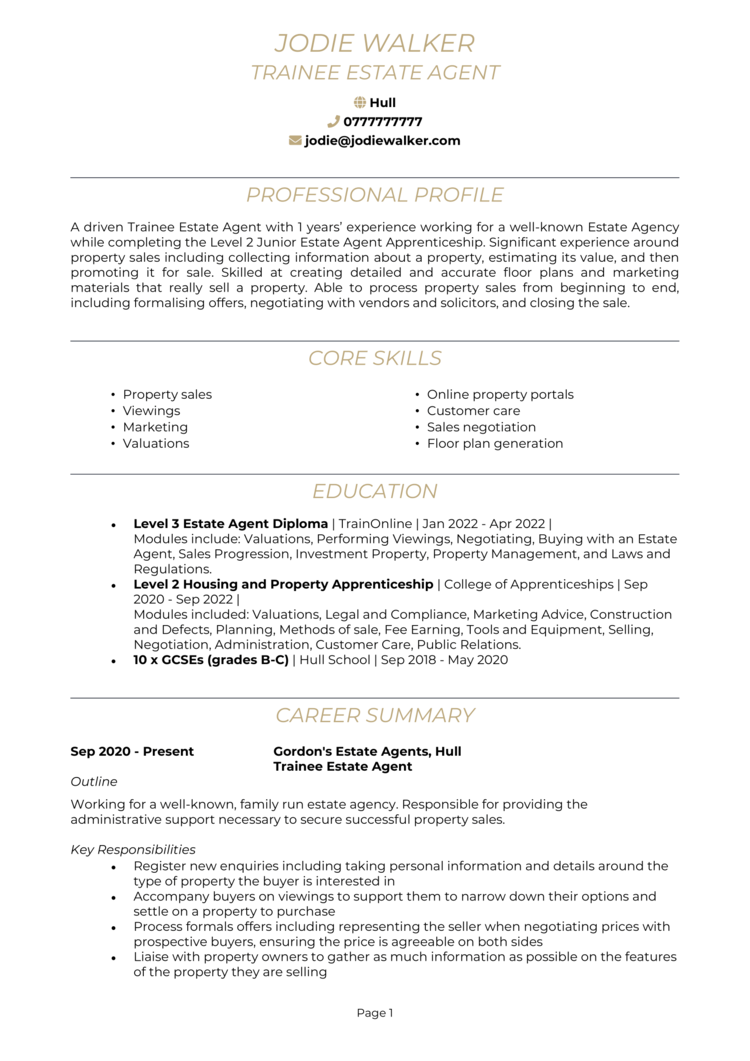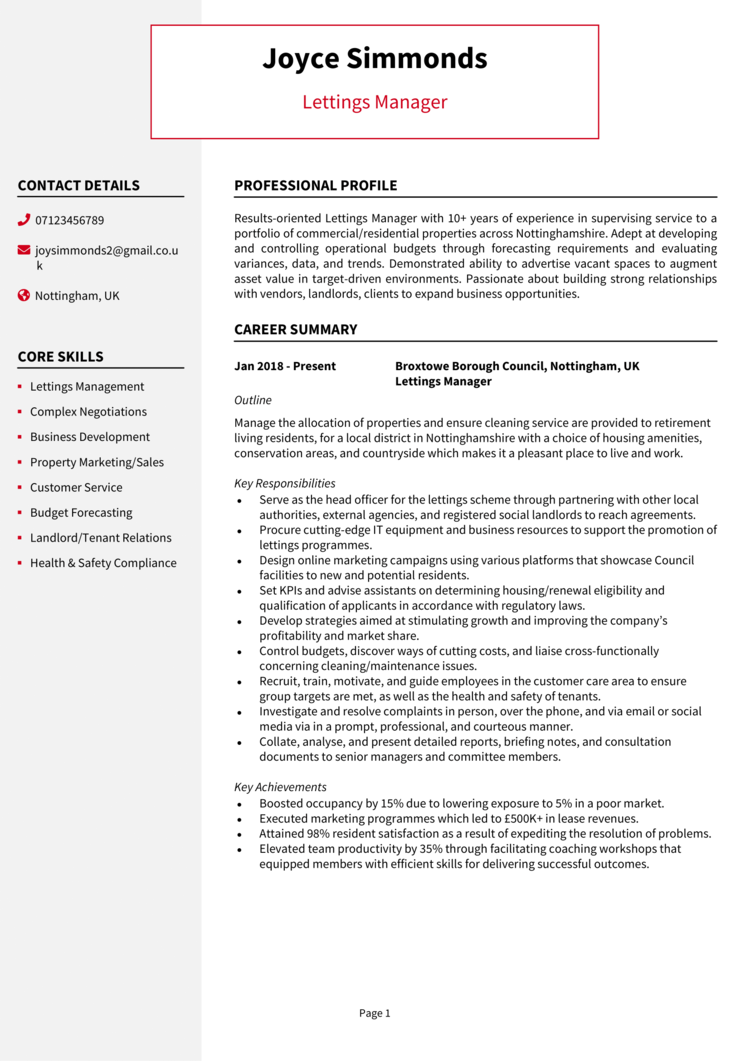As a great estate agent, you wouldn’t try to market a property without great photos and a strong listing, so don’t bother with a CV that doesn’t showcase your best features.
But in a competitive industry, a CV that proves you understand the market and know how to manage clients can be difficult.
This guide and its Estate Agent CV examples will help highlight your property expertise, negotiation skills, and client-focused approach, ensuring you stand out in the real estate industry and get hired.
Lettings Negotiator CV example

Sales Negotiator CV example

Trainee Estate Agent CV example

Property Manager CV example

Lettings Manager CV example

How to write your Estate Agent CV
Discover how to craft an Estate Agent CV that lands interviews with this simple step-by-step guide.
An estate agent’s success relies on presentation and persuasion – your CV should follow the same principles. By the end of this guide, you’ll know everything you need to help write a CV that showcases your ability to manage listings, negotiate contracts, and above all else, provide outstanding service.
The best way to structure your Estate Agent CV


Just like a great viewing, your CV should make a strong first impression and leave them wanting more: you’ll need to show hiring managers your skills, experience, and market knowledge in a quick and easy way. Your CV’s layout will need to be organised and results-driven to accomplish this.
Here’s how to structure your CV:
- Name and contact details – Start with your name and contact information – make it simple for recruiters to reach you. Including a photo is a personal choice.
- Profile – Use this section to summarise your experience, strengths, and what makes you a standout candidate.
- Core skills – Bullet point your biggest strengths, such as property valuation, negotiation, and client relationship management.
- Work experience – Give a structured breakdown of your past roles, highlighting sales performance, customer service, and industry impact.
- Education – List off your relevant real estate qualifications, training, degrees, and certifications.
- Additional info – This section is optional, but it’s a good place for awards, industry memberships, and hobbies that complement your CV.
Estate Agent CV format


A well-formatted CV makes a strong first impression – just like a well-presented property. If your CV is cluttered or full of readability mistakes, key details may be overlooked, which will cost you jobs.
Follow these formatting tips to ensure a clear format:
- Bullet points – Employ short, punchy bullet points to make responsibilities and achievements easy to read.
- Divide sections – Use clear section headings to organise your experience and qualifications.
- Use a clear and readable font – Choose a professional, readable font that keeps the focus on your content.
- No more than 2 pages – This is the ideal length to provide all the essential information while staying concise.
CV profile for an Estate Agent


Your CV profile should introduce you as a skilled estate agent with a strong understanding of the property market. This section should highlight your ability to generate leads, close deals, and provide excellent client service. If your profile doesn’t grab attention, your CV might not make it past the first round of viewings.
Estate Agent CV profile examples
Profile 1
Results-driven Estate Agent with four years of experience in residential property sales, client relations, and market analysis. Skilled in property valuations, contract negotiations, and lead generation. Proficient in using CRM systems to manage client portfolios and track market trends. Dedicated to delivering exceptional service and helping clients find the perfect property.
Profile 2
Dynamic Estate Agent with three years of experience in both residential and commercial real estate. Adept at conducting property viewings, negotiating deals, and managing sales pipelines. Experienced in marketing properties through digital and traditional channels. Committed to maximising sales opportunities and providing a seamless customer experience.
Profile 3
Experienced Estate Agent with over six years of expertise in lettings, property sales, and investment portfolios. Skilled in client acquisition, market appraisals, and property management. Proficient in using property management software and social media marketing to generate leads. Passionate about delivering high-quality service and closing profitable deals.
Details to put in your Estate Agent CV profile
Here’s what to include for a good profile:
- Property experience – Mention whether you specialise in residential, commercial, or luxury property sales.
- Sales and negotiation skills – Demonstrate your ability to secure deals and maximise property values.
- Market knowledge – Show your expertise in property valuations, market trends, and legal requirements.
- Customer service excellence – Highlight your ability to manage client relationships and provide tailored property solutions.
- Lead generation and networking – Prove your ability to attract new clients and expand business opportunities.
Core skills section


A strong skills section makes it clear why you’re the best candidate – without the need for negotiation. You’ll need a mix of sales, communication, and market analysis skills to give hiring managers a clear snapshot of what you bring to the role.
If you specialise in high-end properties, commercial leasing, or first-time buyers, tailor your skills to match. Employers look for agents who can balance market knowledge with strong interpersonal and negotiation abilities.
Best skills for your Estate Agent CV
- Property Valuation – Assessing market trends, location, and property features to determine accurate pricing.
- Sales and Negotiation – Closing deals by negotiating terms between buyers, sellers, and landlords to secure the best outcomes.
- Market Research and Analysis – Monitoring property trends, local demand, and competitor activity to provide informed advice.
- Client Relationship Management – Building and maintaining strong relationships with buyers, sellers, landlords, and tenants.
- Property Marketing – Creating compelling listings, staging homes, and utilising digital marketing strategies to attract potential buyers.
- Viewings and Open Houses – Organising and conducting property viewings, answering questions, and highlighting key selling points.
- Legal and Regulatory Compliance – Ensuring property transactions adhere to local property laws, contracts, and compliance requirements.
- Mortgage and Financing Knowledge – Advising clients on financing options, affordability, and mortgage processes.
- CRM and Sales Software Proficiency – Using estate agency software like Zoopla, Rightmove, or Salesforce to manage listings and client interactions.
- Time Management and Multitasking – Managing multiple properties, clients, and transactions efficiently to meet sales targets.
Work experience


Selling homes is about results, and so is your CV – focus on the impact you’ve made in your previous roles. Your work experience section should showcase your client management skills and contributions to business growth.
Instead of listing duties, focus on measurable success. If you’ve increased revenue, closed high-value deals, or built a strong client network, highlight these achievements. Quantifying your impact – such as sales volume or percentage increase in client acquisitions – will make your CV stand out from the rest.
If you’re new to the industry, include experience in sales, customer service, or business development that demonstrates transferable skills.
How should you list jobs on your Estate Agent CV?

- Outline – Provide a brief overview of the agency or company you worked for and the types of properties you managed.
- Responsibilities – Detail your key tasks, such as negotiating sales, managing listings, or advising clients. Use action words like “negotiated,” “evaluated,” and “marketed.”
- Achievements – Showcase measurable success, such as exceeding sales targets, growing a client base, or securing high-value deals.
Example jobs for Estate Agents
Estate Agent | Omega Properties
Outline
Managed property sales and lettings for a local letting agent, assisting clients in finding and purchasing their ideal home or investment property.
Responsibilities
- Conducted property valuations and provided sellers with accurate market insights.
- Arranged and conducted property viewings, highlighting key selling points to potential buyers.
- Negotiated sales contracts and rental agreements, ensuring favourable terms for clients.
- Maintained and updated property listings on online portals and agency platforms.
- Built strong client relationships, offering expert advice on market conditions and financing options.
Achievements
- Increased sales revenue by 35 percent through targeted marketing and lead conversion strategies.
- Successfully closed over 50 property transactions within 12 months.
- Recognised for exceptional customer service and consistently exceeding sales targets.
Letting Agent | Vault Residential
Outline
Managed the rental process for residential properties, ensuring landlords and tenants received professional and efficient service.
Responsibilities
- Conducted property inspections and prepared detailed reports for landlords.
- Advertised rental properties on various platforms, attracting a high volume of prospective tenants.
- Arranged and conducted viewings, providing detailed property information.
- Managed tenancy agreements, ensuring compliance with legal and regulatory requirements.
- Handled deposit management and coordinated maintenance requests with landlords and contractors.
Achievements
- Increased tenant occupancy rates by 25 percent through effective marketing strategies.
- Reduced void periods by optimising tenant placement and lease negotiations.
- Maintained a 98 percent landlord retention rate through excellent communication and service.
Senior Estate Agent | Super Homes and Investments
Outline
Led property sales and investment strategies, managing high-value residential and commercial property transactions for a regional estate agents.
Responsibilities
- Developed sales strategies to attract buyers and investors to premium properties.
- Managed high-net-worth client portfolios, providing tailored property investment advice.
- Negotiated complex sales transactions, ensuring smooth completions.
- Coordinated with mortgage advisors and solicitors to facilitate property deals.
- Provided training and mentorship to junior estate agents to improve sales performance.
Achievements
- Generated £5M in property sales within 18 months through targeted client engagement.
- Expanded the company’s investor network, increasing repeat business by 30 percent.
- Awarded ‘Top Sales Agent of the Year’ for exceeding revenue targets.
How to write your education section


Your education section should highlight formal qualifications, relevant training, and industry certifications. While qualifications are important, recruiters prioritise experience, so keep this section nice and concise.
If you hold property-related qualifications, such as a diploma in estate agency or a certification in property law, list them here. Additional training in sales, negotiation, or marketing can also strengthen your application.
For those entering the industry, highlight transferable coursework or training that supports a career in real estate.
What qualifications do employers look for in an Estate Agent CV
- Level 3 Certificate in Property (Residential Sales) (NAEA Propertymark) – A recognised qualification for estate agents.
- RICS (Royal Institution of Chartered Surveyors) Membership – Beneficial for agents involved in valuations and property management.
- Diploma in Estate Agency (NfoPP) – Provides formal training in property sales, lettings, and legal frameworks.
- Sales and Negotiation Training Certification – Strengthens commercial and client-handling skills.
- Property Law and Conveyancing Course – Useful for understanding the legal aspects of real estate transactions.





